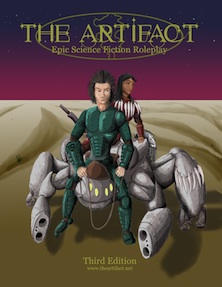 You want to game? Right now? Okay give me ten minutes and I’ll have a game for you.
You want to game? Right now? Okay give me ten minutes and I’ll have a game for you.
I’ve never used a pre-made game despite GMing for probably more than twenty years. I’ve purchased them because they had interesting stats or maps but never ran them. The other GMs I know didn’t either, for some reason it was never our thing. I don’t know where most GMs today fall on the subject of pre-made games, only that I see a lot of them so someone is using them.
I’m also not sure who spends hours and hours setting up a game. Now don’t get me wrong, I’ve prepped for games before and on occasion I have spent several hours on the prep, usually drawing maps but it’s not usually how I set up a game.
So if you GM the same way maybe I’ll say something here useful to you but if you’ve wanted to be able to make up a session at a few minute’s notice, hopefully this will be what you’ve been looking for.
What does the game need?
There has to be a general story to the situation. Even if the players are wandering the countryside looking for trouble, there should be a reason why (incidentally roving games tend to be fun for the players unless over used). Usually the most straight forward way of figuring out the general story is to decide what you are willing to offer the PCs to entice them into the game. In many games the PCs are masters of their own fate and can pick and choose what they want to do. In others they don’t have much of a choice or very bad things happen to them (jail, death, lose money, etc.). If you want to dangle a big cash reward in front of them, someone with tons of cash is suddenly involved and you now have a flavor of where the story will go. Keep in mind the characters needs and the player’s style if you know it. You don’t want to offer the wrong reward or the players won’t find it compelling.
Now that you have the why, you’ll need a little bit more of a plot. Don’t go too far with this though because the players ultimately shape the plot. What you want is a skeleton, something like a treasure hunt, a murder mystery or a rescue. A good reference is the Big List of RPG Plots. I don’t use it often but it’s been useful when I’m in a funk and can’t think of a plot I’d like to run.
The game needs some kind of challenge. Preferably there should be two or three. More than that and the game will need to be split into several sessions. If there’s only one, the game will not have a proper build up to crescendo. Speaking of build up, it may be obvious but the hardest challenge should come last. Be careful with gauging the difficulty because if the PCs are beat up from previous challenges they may need the last challenge to be easier than earlier challenges because they’ve lost effectiveness. Now gauging how well the PCs will handle a challenge may be one of the hardest things to get right on the first try but it can be fixed mid game. Challenges don’t have to be combat. Mystery game challenges usually include the major clues being revealed and the players have to figure out how to interpret them.
Now tie them all together keeping in mind that the players will do things you don’t expect. Make sure you know what to do if the players reject the reward you wanted to entice them with. Figure out what happens when the players try to go around your challenge (A maze? I’m going to smash down the walls!).
You don’t need more than that. Going further with preparation might add flavor to the game but it also can lead to railroading because you want the players to experience what you put together. So the last thing you’ll need is a willingness to change everything when it doesn’t work. Put it in a different order, scrap it or just wing it. The players are winging it for the most part and having fun doing it. There’s no reason the GM can’t have the same fun.
Useful things
Unless the environment is well understood (forest, mountain side, dessert, single city street) making even a quick map will be highly beneficial. Even if you think you’re explaining the situation well, players will form very different mental images of what you describe. Now I’ve drawn up plenty of maps on the fly. I once drew up the floor plan of a five story palace as the players were running around in it. I’ve been drawing maps for years, so unless you think you can draw up maps as needed, prepare them before hand.
Nothing kills the introduction of an NPC more than when the players say “What’s your name?” and you have to think for a moment to come up with one. Having a few names handy for major NPCs plus a few extras for incidental NPCs makes things run smoother. Don’t be afraid to just say “He’s just a guard, no one special.” but sometimes the players want to include a meaningless NPC in their plans, giving them a name makes their planning easier.
I don’t think I can wing it, it’s scary!
Relax, let the players drive the action and when they’re looking to you for an answer, use the rules, your judgement or both to answer the question. You will bungle some responses but you’ll get better with time.
Always try to balance how you expected the story to go with what the players want to do and what will keep the story moving. Maybe the hardest things for me to overcome was the feeling of “It wouldn’t really happen like that”. I always wanted the game to be ‘realistic’ and I would sometimes frustrate my players because the players wanted to move in a direction that I just felt wouldn’t work. They would fail, but instead of turning to a different tactic, they would modify what they were doing or try harder which would only lead them further into what I felt was an ineffective or improbable plan. Unless it’s a major plot point that I don’t want them to waltz through I now feel it’s better to let it happen. I might penalize them a little if I feel the need to. Most of the time I’ll make them pass a skill check and move on.
Honestly
I’m not claiming anything special or unique here. This is such an intuitive process for me at this point but it came by trial and error so it’s difficult to codify into specific steps. This is about 80% of my process, the other 20% is a branching tree of processes that would take a book to write down. I also think that most GMs can fill in those blanks themselves.


 The Free RPG Blog
The Free RPG Blog
Can’t wait for your game to come out, I like games to text based games. 🙂
The Artifact RPG is as “out” as it is likely to be. It’s a free download as a PDF and as a book on Lulu.